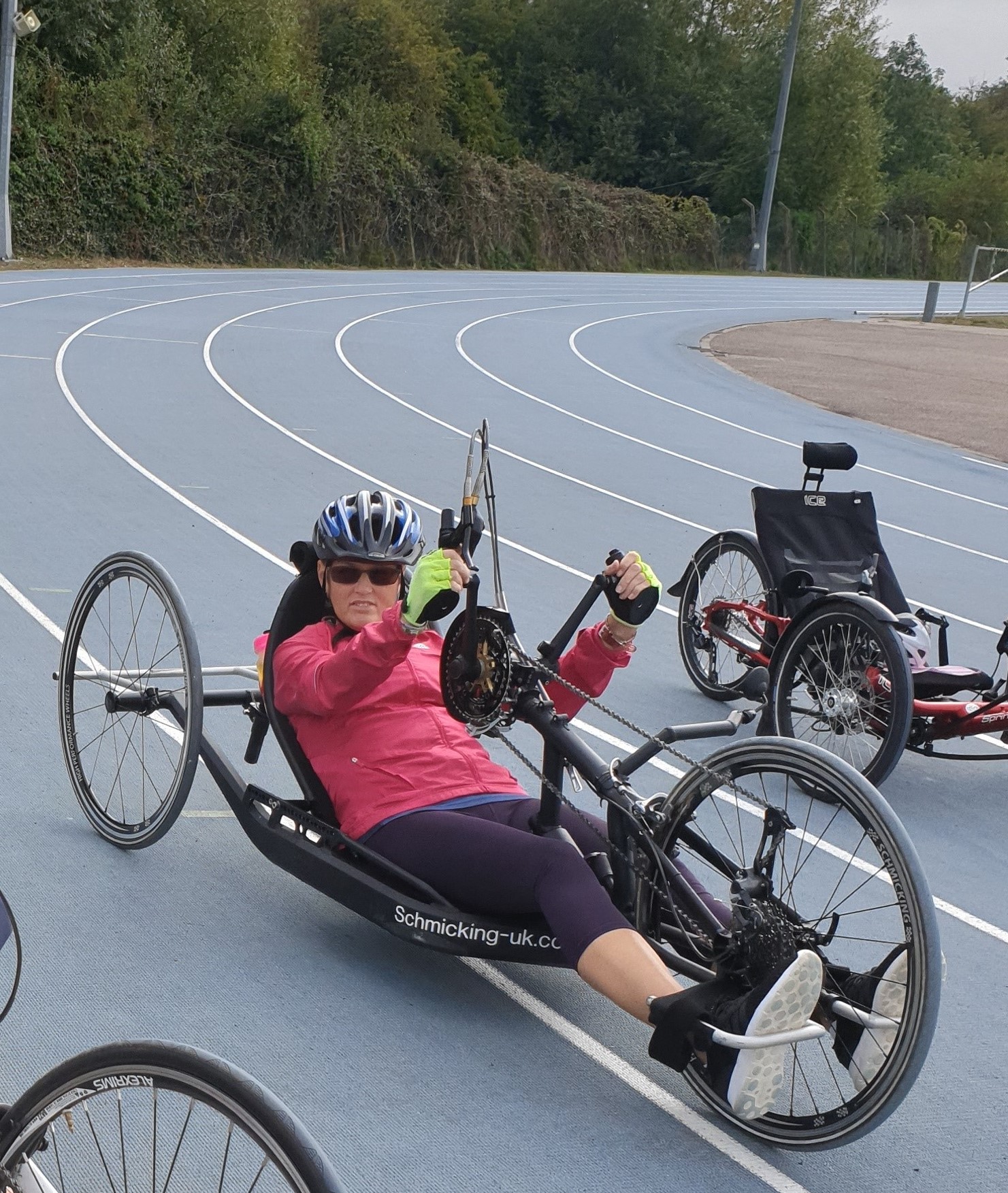Clare Gibson from Didcot, a former Combat Medical Technician in the Royal Army Medical Corps, is one of a team of six wounded veterans who use cycling to help overcome a variety of mental and physical health challenges – from PTSD and spinal injuries to arm paralysis and chronic illnesses – who are urging others to join them and saddle up to raise vital funds for fellow wounded and sick veterans.
Clare, 46, has signed up to take part in Help for Heroes’ new cycling fundraiser, Heroes Ride 200, which asks participants to ride 200 miles, individually or cumulatively as a team, anywhere, and on any bike, between 1st – 30th June. Along with five other veterans, she has created a special veterans’ team, the ‘Heroes Team’, who have signed up together for mutual support and motivation. They also aim to highlight the positive impact of cycling on physical and mental wellbeing, while promoting the inclusivity of Heroes Ride 200 as a cycling event. She will be cycling 200 miles on her hand bike.
Clare loved her Army career and took on every experience with grit and determination. In 1999 she was deployed to Kosovo. Alongside working in the field hospital, she was part of a team tasked to exhume shallow mass graves and prepare the bodies to be re-interred. Three years later, after leaving the Army and having her baby daughter, she started to have nightmares and flashbacks. Only years later did she realise that this harrowing experience had left her with Post-Traumatic Stress Disorder (PTSD).
Added to this, in 2012, Clare was diagnosed with Behçet’s Disease, a rare condition which causes blood vessel inflammation throughout the body. The disease can cause an array of symptoms such as mouth ulcers, joint pain, bowel problems, nerve damage, migraines, nausea and chronic fatigue. It has had a huge impact on her life, severely affecting her mobility and making her rely on crutches and a wheelchair to maintain her independence. It has also had a detrimental impact on her mental health.
Reaching out to Help for Heroes, Clare received support from the charity’s Hidden Wounds and Sports Recovery teams. They helped her to confront her PTSD, reignite her passion for sport and set her off onto her cycle path to recovery. She loves handcycling and finds it helps her with both her physical and mental health. During lockdown last year, as well as using Help for Heroes virtual cycling classes, she set up her handcycle in the back garden and challenged herself to cycle 226 miles over 13 weeks to raise money for Behçet’s UK. 14 weeks later she had reached 1,000 miles.
Between now and the end of June, Clare and her fellow Heroes Team members will be telling their stories, sharing training tips and progress on social media which will be shared on Help for Heroes’ own social media channels. They even hope they will be able to meet up for a finale to the challenge on 30th June if Covid restrictions allow!
Whilst 200 miles is a challenging, but far from impossible, distance for most weekend cyclists, it can be a huge individual challenge for many veterans who have been injured or become ill as a result of their time in the Armed Forces. This is why Heroes Ride 200 is encouraging teams as well as individuals to sign up so that, even if someone only feels able to cycle five miles, they are still contributing and making a difference to the team total.
Clare says, “Cycling has become a medicine for both my PTSD and Behçet’s symptoms. I genuinely can’t stress enough how powerful it’s been in my recovery. Eight years ago, just getting on my bike would have been a challenge, but now I am genuinely excited to be part of the Heroes Team and see if we can smash our target in June. We hope that by showing people that a group of veterans with different injuries and illnesses can take on this challenge, we will inspire others to sign up to Heroes Ride 200 and see how great getting out on a bike makes them feel.”
Hannah Lawton, Sports Recovery Manager at Help for Heroes, adds, “Cycling is a great sport for anyone. The Heroes Team embody the amazing spirit of our cycling veterans and, as their assortment of hand bikes, recumbent trikes and upright bikes show, there is a bike to suit pretty much any impairment, making cycling one of the most adaptive sports there is. This is what has made cycling a core activity in the recovery of many of our veterans.
“With Heroes Ride 200 we hope to encourage many others to join us, whatever their skill or fitness level, and experience all the mental and physical health benefits of being on two wheels. All whilst raising vital funds for wounded and sick veterans.”
Ninety-seven-per-cent of Help for Heroes’ income comes from the great British public, but it experienced a 65% loss to its income from events in 2020 due to the pandemic. At the same time, demand for the charity’s services is going up. During the first lockdown, there was a 33% increase in those coming forward for mental health support.
To sign up to Heroes Ride 200 visit https://heroesride.helpforheroes.org.uk/.
